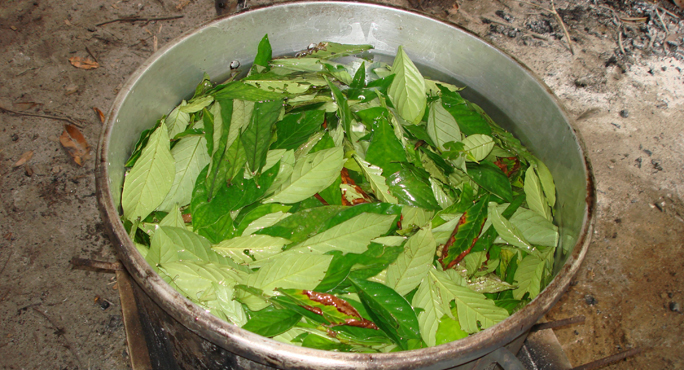Making Ayahuasca in Iquitos, Peru. Photo by Chris Kilham
If you thought that the psychedelic movement ended with the flamboyant, paisley-clad times of the early 1970's and the Jefferson Airplane singing "White Rabbit," think again. The psychedelic movement has indeed kept moving, often in laboratories, hospitals and clinical settings where the use of mind-altering drugs has been intensively studied for their unique benefits to overall health and well being. Brain monitors have replaced tambourines, and stethoscopes have replaced roach clips, but the psychedelics themselves just keep on moving through human history.
Enter the MAPS Psychedelic Science Conference, the brainchild of Harvard Ph.D. Rick Doblin, whose decades of pioneering scientific work with psychedelics is bringing together a virtual scientific psychedelic Woodstock of talented presenters from all over the globe April 18-23 in Oakland, California. Often referred to as "Oaksterdam" in reference to its profuse number of legal cannabis shops, this San Francisco Bay city seems an ideal location for the heady conference.
The term psychedelic was first coined by British psychiatrist Humphrey Osmond in 1957, and means "mind-manifesting." The psychedelic drugs include LSD, mescaline, psilocybin, DMT, MDMA (Ecstasy) and whole plants and fungus, including peyote, magic mushrooms, ayahuasca, and other agents. MAPS, which stands for Multidisciplinary Association for Psychedelic Studies, was founded in 1986 by Doblin, and has functioned as a clearing house for science supporting the intelligent and therapeutic uses of psychedelic drugs.
The conference will focus to a great extent on clinical research into the use of psychedelic drugs for a wide variety of health needs. There is plenty of science to draw upon, with medical doctors by the dozens presenting their findings. Psilocybin, for example, the active agent in magic mushrooms, demonstrates benefit in treating alcohol dependence. The same drug also allays fear and anxiety about dying among terminally ill cancer patients. Researchers including medical doctors Charles Grob, Torsten Passie and Stephen Ross will all present on this fascinating drug at MAPS.
MDMA or Ecstasy, the much-feared and spurned drug that is the topic of hundreds of lurid articles, proves greatly beneficial in the treatment of post-traumatic stress disorder among war veterans, fire-fighters and police officers. First developed by Merck Pharmaceuticals in 1912, the invention languished on the shelf until the 1980's when it emerged as a party drug. Eventually MDMA became the focus of medical investigations into its benefits in cases of trauma, with good results. Workshops by Peter Oehen, Annie Mithoefer and scientists from the US, Israel, Canada, the UK and Australia will all present on breakthroughs with MDMA.
LSD, the great-grandfather of the psychedelic movement, was developed in the Sandoz Pharmaceuticals laboratories by Dr Albert Hofmann in 1938. The drug got its big boost into public prominence in the mid 1960's, when a small group at Harvard university began to conduct ad hoc experiments. The leader of the LSD movement, Dr Timothy Leary, exhorted LSD users to "turn on, tune in, and drop out." Times have changed. David Nichols, Torsten Passie and famed medical doctor Stan Grof will all speak on the therapeutic benefits of LSD, gleaned from decades of clinical science.
An entire conference track on the Amazonian hallucinogenic brew ayahuasca will focus on the many ways that this curious and extremely potent rainforest psychedelic helps people with substance abuse disorders and some cases of cancer, as well as idiopathic disorders -- health problems whose causes are unknown. From jungle shamans to brain research centers, this hallucinogen has traveled far.
For most people, psychedelics either are simply read about on occasion in the news, or a memory from college. But for the numerous dedicated presenters at the MAPS Psychedelic Science conference in April, these fascinating drugs are the subjects of entire careers. Instead of "turn on, tune in and drop out," the new mantra for psychedelics just might be "study carefully, investigate well, and help others." That seems to be the message of the MAPS conference.


